Is it the “Musk Effect” at play? Industry analysts say a growing backlash aimed at Tesla CEO Elon Musk is clearly responsible for the carmaker’s sliding sales and market share in the key EV market of California, as well as in Europe. But that only complicates the challenges the automaker is facing from growing competition from both traditional automakers like Hyundai, GM and Ford, as well as the increasingly aggressive Chinese brands. More from Headlight.News.
Tesla sales and earnings came in well under what analysts and investors had anticipated last year – but the numbers are substantially worse when you focus in on results in California, the largest EV market in the U.S.
Demand, meanwhile, is rapidly declining in Europe, especially in five key national EV markets: the UK, France, Sweden, Norway and Netherlands, based on January results.
What some have dubbed the “Musk Effect” appears to be working against the Texas-based EV manufacturer as criticism of Tesla CEO Elon Musk controversial role in the Trump administration mounts.
“Musk has done Tesla no favors with his political activities,” said Sam Abuelsamid, Vice President of Market Research for Telemetry, complicating other challenges, such as rising competition in the EV market.
Losing momentum
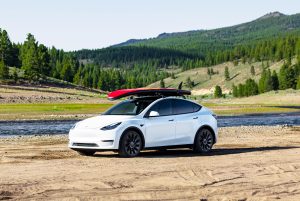
Tesla lost money last year, the deficit growing during the fourth quarter as it ramped up incentives and cut prices to boost sales of products like this Model Y.
Last year wasn’t a good one for Tesla. The automaker saw global demand drop by 1.1%, its first annual decline in a dozen years. The numbers did post a modest 2.3% gain during the final quarter of 2024 – but that came at a hefty price.
The automaker was forced to engage in the sort costly discounting it use to deride competitors for: 0-interest financing, price cuts, low-price leases and free charging.
That translated into a gloomy financial report released on January 29 showing a big miss on Wall Street expectations. At $25.71 billion, or $0.73 a share for the fourth quarter, the company’s revenues fell short of the consensus forecast of $27.22 billion, or $0.77 a share. Gross profits fell 6% — and would have been worse if the company hadn’t been able to sell more regulatory credits than the year before. Earnings per share, meanwhile, fell 22%.
But Tesla’s official release actually downplayed just how much trouble the company is facing, notably in some key markets.
California dreaming
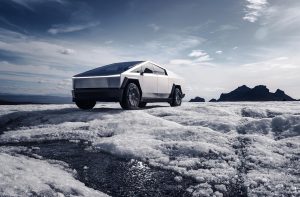
The Cybertruck appears to be fast losing sales momentum, Tesla cutting production at its factory in Austin, Texas.
Originally based in California, Tesla scored big with the Golden State’s motorists with products like the original Model S sedan and Model X SUV. With the launch of two smaller products, the Model 3 sedan and Model Y SUV, the automaker solidified its position as the state’s best-selling EV brand. The Model Y, in fact, has been California’s best-selling vehicle overall for several years.
Tesla doesn’t break out sales data by region. But by accessing data on new registrations, Cox Automotive Cox Automotive estimated demand for Tesla products dropped 6% in the U.S. last year – or nearly six times the global decline — to around 633,000 EVs.
A closer analysis now shows that registrations in California were off 12% for the year and, despite all the lucrative incentives, fell 8% during the fourth quarter, reported the California New Car Dealers Association. To add perspective: the trade group noted that overall California new vehicle sales were down 0.3% in 2024, while they rebounded to a 4.8% gain for the fourth quarter.
“All of the decrease in the state market last year was attributable to Tesla, which had an 11.6 percent decline,” said the dealer group in a statement. “Registrations for all other brands increased 1.4 percent.”
More Tesla News
- Tesla 2024 Sales Fell for 1st Time in a Dozen Years
- Is Musk’s Political Shift Hurting Tesla?
- “Juniper,” Tesla Model Y Update, Arrives in March
Europeans bail
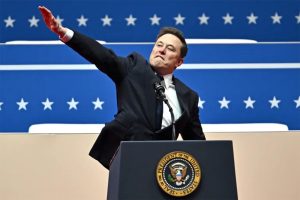
Musk was called out by media around the world for appearing to give something resembling the Nazi salute during the ceremonies following Trump’s second inauguration.
California was just one of the markets where Tesla lost ground last year. And preliminary figures show the downturn continues in Europe where five major EV markets recorded a decline in January. Tesla registrations for the month plunged 63% in France, 44% in Sweden, 38% in Norway, and 42% in the Netherlands.
The decline was a more modest 12% in the UK, but the EV maker fell from second on the EV sales list to seventh, according to data published by New AutoMotive.
Tesla’s sales decline is mirrored by the fall in public attitudes towards the brand. In Sweden, only 11% of those surveyed two weeks ago by Novus had a positive view of Tesla, down from 19% just a few weeks earlier. Those with negative views rose from 47% to 63%.
Playing politics
The downturn directly coincided with Musk’s rise to power in the new Trump administration. After investing nearly $300 million to help the new president and allies win last year’s race, Musk has become one of the most powerful members of Trump’s kitchen cabinet, linked to a variety of controversial moves, including efforts to slash foreign aid and oust millions of U.S. federal employees. He was also responsible for leading a team who have accessed government financial information covering virtually all U.S. citizens.
Trump has also insinuated himself into European politics, notably lending his support to the far-right Alternative for Germany, or AfD, party, going so far as to tell members not to feel guilty for what their relatives did during the Second World War. It didn’t help that, during Donald Trump’s inauguration ceremonies Musk twice did what many observers saw as the traditional Nazi salute.
But even before the election, Musk already was alienating many owners and potential buyers. After buying Twitter he renamed the social media service X and led a marked shift to the political right. He also moved Tesla headquarters to Texas while repeatedly taking swipes at California and its various elected officials.
“The Musk Effect has become a much bigger factor than 12 to 18 months ago,” said analyst Abuelsamid.
Alienating fans

“I bought this before we knew Elon was crazy,” has become a popular bumper sticker, noted a post by “Neal’s reviews and unboxings,” a popular influencer channel on YouTube.
Spend time on social media and one is likely to find numerous threads in which one-time fans of Musk and Tesla now express their disdain. You can also find bumper stickers saying things like, “I bought my Tesla before I knew Elon was nuts.” Some surveys in the U.S. and Europe have found many buyers saying they’d like to sell their Teslas. Others are swearing off the brand.
German motorists bought just 1,277 of the company’s EVs in January, according to the federal transport authority KBA, analysts directly linking the 60% year-over-year decline to Musk’s support of AfD.
A January survey of British EV owners by Electrifying.com found 59% saying they’d not buy a Tesla because of Musk.
“Musk’s influence on the brand is becoming increasingly polarising, pushing many buyers to look elsewhere,” the website’s CEO Ginny Buckley told Reuters.
Competition is another problem
And things couldn’t be happening at a worse time for Tesla in terms of competition, added Abuelsamid. Dozens of new EVs were launched in the U.S. last year and even though some manufacturers are slowing their launch plans as EV sales growth slows, there are dozens of fresh alternatives, such as the new Hyundai Ioniq 9 SUV and Chevrolet Silverado EV pickup.
The same is true in Europe where EV rollouts have been even more aggressive than in the U.S. There are now 130 in the UK, noted Buckley, up from 25 in 2020. That may help explain why Tesla sales there have fallen behind Volkswagen, Mercedes and Stellantis, among others. Europe has also seen a wave of new products from fast-growing Chinese brands like BYD, Zeekr, Geely and Great Wall.
Tesla, by comparison, has launched only the controversial and slow-selling Cybertruck in recent years. An update of the Model 3 sedan was criticized by reviewers for being too little too late, and has yet to show any positive momentum. A more aggressive refresh of Tesla’s Model Y is coming this spring but it’s too early to tell if it will overcome the growing pushback Tesla faces.
Whether due to politics or more aggressive competition, Tesla faces some serious challenges ahead. Few observers are surprised to see the automaker lose market share which, in the U.S., fell to 47% last year, down from 54% in 2023, according to Telemetry Research data. It simply couldn’t retain a majority stake as the EV market grows and more products roll into showrooms.
But losing sales in a growing market is another matter entirely.


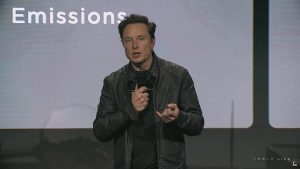
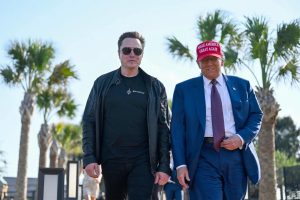
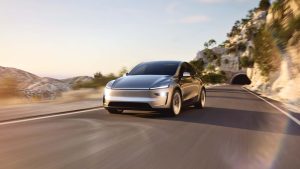


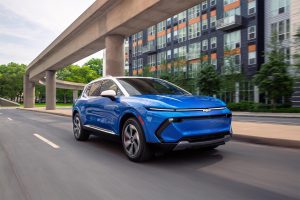
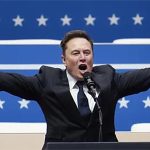
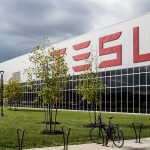


0 Comments